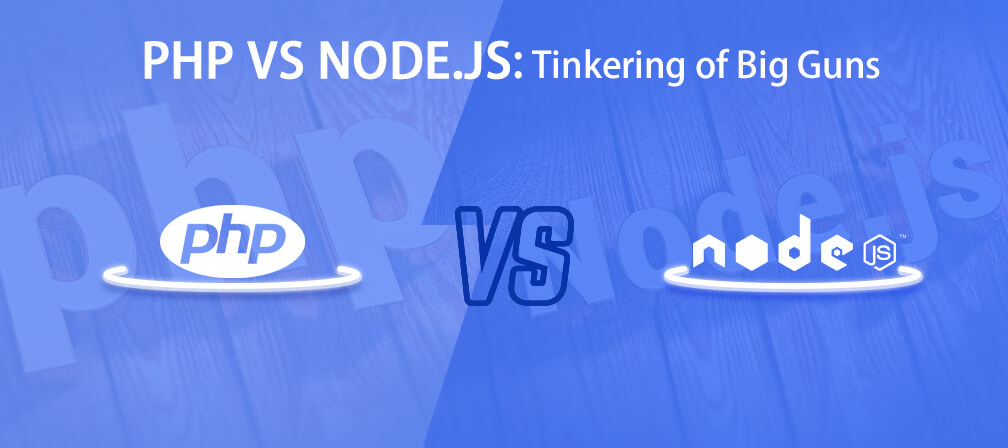
Table of Contents
PHP is a veteran in programming world now, seasoned with many use cases and adorned with many successful applications running on the web, it was developed way back in 1994 and was considered to be one of the top languages of Web 1.0 era. PHP has powered many successful content management systems like WordPress, Drupal, and Joomla. Another way around, Node.js is a runtime environment that makes use of JavaScript for server-side application development. Founded in 2009, Node.JS explores JavaScript to the fullest and is extensively being used to build event-based, data-driven, I/O-heavy applications for the Web 2.0 era. E-commerce and chat applications are some popular examples. Look what we’ve got here:
Three features that make PHP as convivial as Node.js:
Factors one must check while making a choice for the next development project:
| Features | PHP | Node.js |
|---|---|---|
| Definition | In simplest terms, PHP is an acronym for Hypertext Preprocessor, is used for server-side scripting and extensively makes use of JavaScript, HTML, CSS and a lot of plain text in their PHP applications. | Node.js is an open-source JavaScript runtime environment that is built on Chrome’s JavaScript Engine (V8). Born in 2009, it facilitates users to create JavaScript-based applications. |
| Powered by two engines | Zend engine powers PHP. | Google’s V8 JavaScript engine powers Node.js |
| Complexity of use | PHP is much simpler to use compared to Node.js. | Node.js requires has an extensive code and requires a basic understanding of closures and callback functions. |
| JSON | PHP makes less use of JSON as compared to Node.js PHP makes use of json_encode() and json_decode() functions. | Node.js gels up well with JSON. Node.js uses JSON.stringify() and JSON.parse(). |
| Concurrency | PHP makes use of multi-threaded blocking I/O to carry out multiple tasks to run parallel tasks. | Node.js makes use of event-driven non- blocking I/O execution model. |
| Execution | PHP is synchronous – If there are 50 lines of code and the first line takes time to execute, then the next line will have to wait as the function in the first line will take time to execute. In PHP, a particular program can often get stuck in a “callback hell”, in case many functions are chained before execution. This might often lead to infinite looping and piping data from one function to another. | Node.js is asynchronous – The function in the next line will execute, skipping the function in the first line in case it takes time to execute. Node.js resolves infinite looping as Async or Await feature helps with executing another block of code if one block is stuck. |
| Execution Speed | PHP is slower than Node.js. | Node.js is faster and lightweight than PHP. |
| Web Server | PHP runs on the Apache or IIS web server. | NPM does not need a web server, it runs on its own runtime environment. |
| Package Manager | A composer package manager is widely used. | Node.js makes extensive use of Node Package Manager (NPM). |
| Context Switching | Users require to keep shifting and switching between codes while working in PHP as it is predominantly a part of the LAMP stack and coding on server-side requires a good knowledge of HTML, CSS, and JavaScript. | Node.js makes use of both server-side as well as client-side scripting based on JavaScript and thus there is no use of switching between the languages. Making use of JavaScript stack (MEAN) it simply makes use of JavaScript coding language and syntax. |
| Modules | PHP makes use of PEAR and Composer modules where PEAR is a framework for reusable PHP components. | Node.js comes bundled along with a package management system called NPM (Node Package Manager) and it’s easy to use and publish registry. |
| Frameworks | PHP comes along with a lot of frameworks that ease out backend development – Laravel (Horizon, Dusk, and Echo), CodeIgniter, CakePHP, Phalcon, Symfony, CodeIgniter, Zend, Yii, Fat-Free, Kohana, Fuel PHP, Flight, Zikula, PHPixie, Slim, Li3, Nette, etc. | Express, full-stack MVC frameworks like Meteor and Derby, total.js, sails.js, Express.js, Koa2, NestJS , LoopBack, Meteor.js, Derby.js, Hapi.js, Mean.io, Total.js etc. |
| Databases | PHP makes use of traditional and relational databases like MySQL, MariaDB, PostgreSQL, and NoSQL etc. PHP users must be careful while making use of MySQL database as it is prone to SQL injection attacks, cross-site scripting (XSS) etc. | NoSQL, MongoDB, CouchDB, Neo4 For Node.js users, NoSQL injection acts as a documented vulnerability. But these are negligible as compared to SQL injection. |
| Web Server Versions | XAMPP servers had to be set up before version 5.4, later versions come with pre-installed servers. | Node.js comes along with some core modules like HTTP, DNS, file system etc. that help in customizing web servers. Express.js, sails.js, and koa.js are some of the popular examples of running web servers. |
| Application Domains | PHP is being used to develop applications that are CPU intensive like scientific applications and meteorology. CMS developed in PHP like WordPress is able to handle bulky blog sites. LAMP stack is used for API development. | Node.js can be efficiently used for developing highly scalable server-side solutions. It is best suited to the event-driven model. The most popular use cases of node.js are chat applications, blogs, and video-streaming applications. |
Related post: Python vs Node.js: Which Will Ameliorate Your Project Better?
Node.Js supports Asynchronous + Event-based architecture makes = Suitable for Real-Time Applications (RTA) like instant messaging, video conferencing and drawing applications as they require multiple concurrent requests and simultaneous shuffling of data.
In addition to this, Node.js has support for server-side events and WebSockets that makes it easy to implement pub-sub (publish-subscribe) architectures which are building blocks of RTAs. These are also helpful in quickly updating the views on the client-side.
Related post: How much does it cost to hire a Node.js developer?
These same features make Node.js suitable for applications that process data from the Internet of Things (IoT) and Single Page Applications (SPAs), which involve dynamic, flexible, and heavy client-side functionality.
PHP is good enough for blogs, landing pages, news sites, web application development, or writing CMS with all sorts of customizations like a well-documented API to change application’s structure, presentation, plugins, infinite customizable themes etc.
PHP is also a helpful resource in case hosting is an issue. Moreover, PHP is more flexible in integration and deployment, in case a shared hosting service is required instead of a full-fledged virtual cloud instance.
Related post: How Much Does It Cost to Hire A PHP Developer?
Surprisal – While selecting between Node.JS and PHP, it is important to consider the type of application that is to be built, hosting requirements according to client and speed and timeframe of the project. If a standardized solution with extensive hosting support is required by the client then PHP must be considered. On the other hand, if fast development (For Real-Time and Single-Page Applications) is required then Node.js must be considered.
It’s a combination of soft skills with matured experiences that make our techies outshine, be it PHP development services or Node.js development. Hire a PHP developer or a Node.js expert who is eager to catch your aggressive expectations and manage a continually challenging job like a legato passage. Colligating facts like Pro-level teams, zero-billing guarantee and flexible hiring models get your hands-down and hire best developers from us!



Manish Jain is the co-founder and Managing Director at Konstant Infosolutions. He is responsible for the overall operations of the company and has played a major role in bringing Konstant up from its humble beginnings and, with his immense energy and drive, transforming it into a globally trusted name in IT solutions.
Or send us an email at: [email protected]